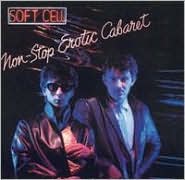Before you run off to Woolworths with your £6 postal order, remember this record is pressed at GZ Media so you will be taking a gamble. Some copies will be clean and sound OK, but others will be covered in a layer of paper debris and offer poor sound reproduction. Whilst my copy is relatively clean the sibilance on any word containing the letter 's' is very apparent.
One anomaly of the vinyl edition is that it contains the original mix of "Purple Zone" and not the version tweaked by the Pet Shop Boys. I presume this is because the vinyl had to be pressed far in advance of the release date and the late substitution of the remixed version could not be accommodated.
There's another (vague) link to Pet Shop Boys with the opening track "Happy Happy Happy" which covers the same ground as PSB's "This Used to be the Future". In both songs the narrator reflects on the fact that the predictions for the future they were fed in their youth hadn't come true. It would seem great minds think alike and both groups have created wonderful tracks.
On "Polaroid" Marc sings of meeting Andy Warhol in 1981 whilst Dave delivers a catchy backing track full of bleeps and booms. One thing that strikes me at this point is that Marc's vocals have changed and his delivery is much more dramatic - almost like he is singing in a West End musical. I'm not saying the vocals are bad; just different.
There are great songs littered across both sides of this record with "Light Sleepers", "Nostalgia Machine" and "New Eden" proving Dave and Marc's really know how to write a tune. On the downside the detached "Heart Like Chernobyl" is a bit of a misfire and the lyrics to "I'm Not a Fan of God" sound uncharacteristically misanthropic. But generally this album is a success and I look forward to hearing more from Soft Cell. 3/5








